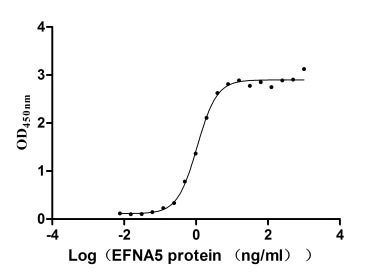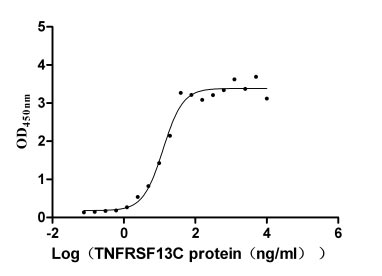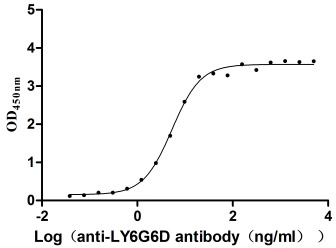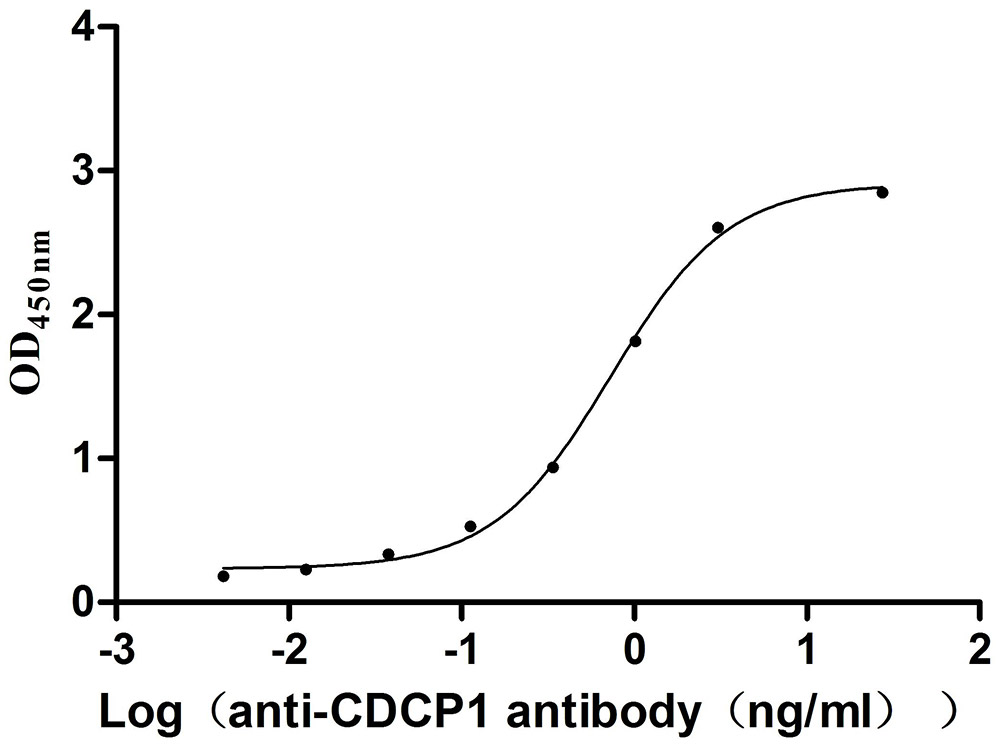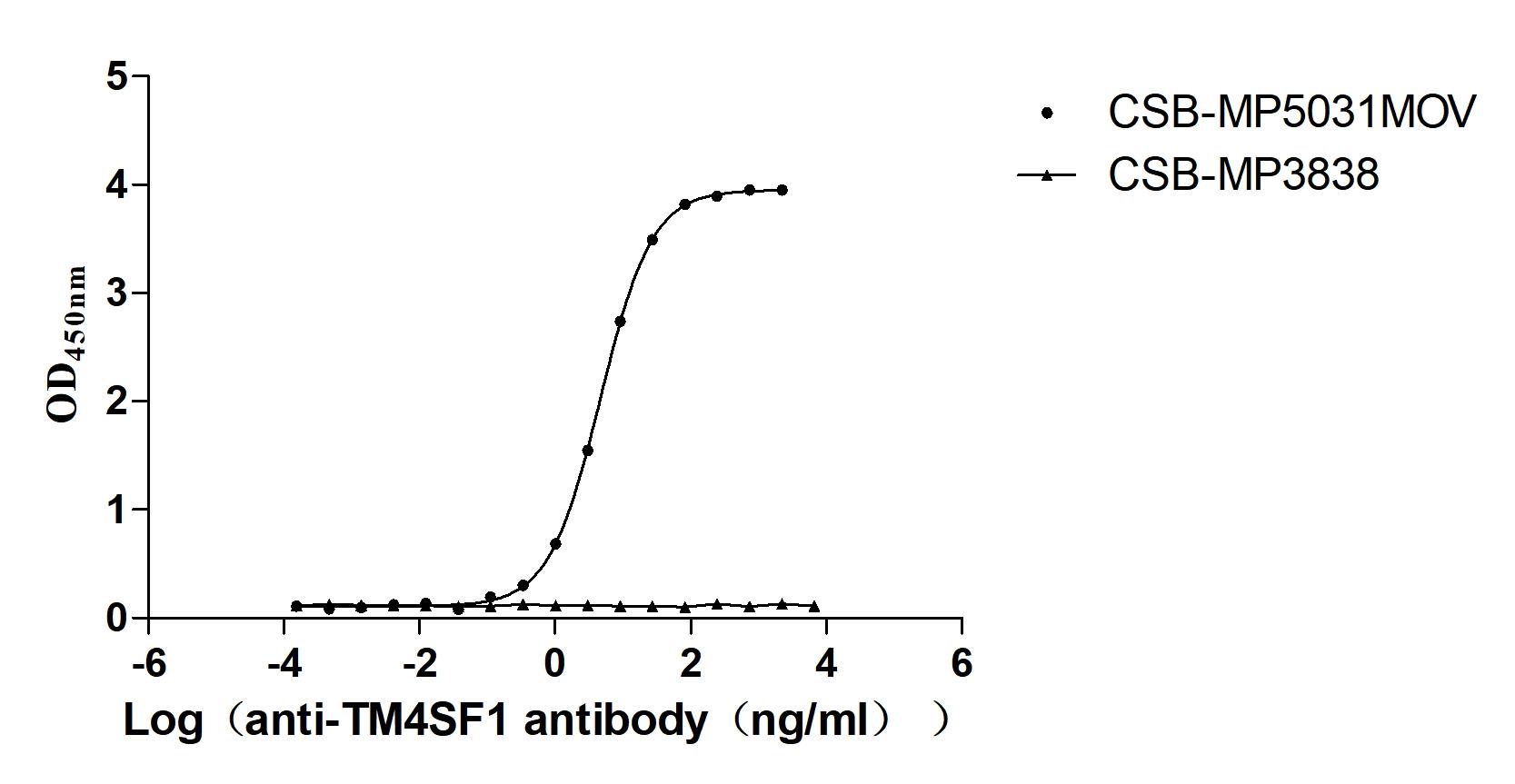Recombinant Mouse Tumor necrosis factor alpha-induced protein 3 (Tnfaip3)
-
中文名称:小鼠Tnfaip3重组蛋白
-
货号:CSB-YP733707MO
-
规格:
-
来源:Yeast
-
其他:
-
中文名称:小鼠Tnfaip3重组蛋白
-
货号:CSB-EP733707MO
-
规格:
-
来源:E.coli
-
其他:
-
中文名称:小鼠Tnfaip3重组蛋白
-
货号:CSB-EP733707MO-B
-
规格:
-
来源:E.coli
-
共轭:Avi-tag Biotinylated
E. coli biotin ligase (BirA) is highly specific in covalently attaching biotin to the 15 amino acid AviTag peptide. This recombinant protein was biotinylated in vivo by AviTag-BirA technology, which method is BriA catalyzes amide linkage between the biotin and the specific lysine of the AviTag.
-
其他:
-
中文名称:小鼠Tnfaip3重组蛋白
-
货号:CSB-BP733707MO
-
规格:
-
来源:Baculovirus
-
其他:
-
中文名称:小鼠Tnfaip3重组蛋白
-
货号:CSB-MP733707MO
-
规格:
-
来源:Mammalian cell
-
其他:
产品详情
-
纯度:>85% (SDS-PAGE)
-
基因名:
-
Uniprot No.:
-
别名:Tnfaip3; Tnfip3; Tumor necrosis factor alpha-induced protein 3; TNF alpha-induced protein 3; EC 2.3.2.-; EC 3.4.19.12; Putative DNA-binding protein A20; Zinc finger protein A20
-
种属:Mus musculus (Mouse)
-
蛋白长度:Full Length of Mature Protein
-
表达区域:2-371
-
氨基酸序列AEQLLPQALYLSNMRKAVKIRERTPEDIFKPTNGIIYHFKTMHRYTLEMFRTCQFCPQFREIIHKALIDRSVQASLESQKKLNWCREVRKLVALKTNGDGNCLMHAACQYMWGVQDTDLVLRKALCSTLKETDTRNFKFRWQLESLKSQEFVETGLCYDTRNWNDEWDNLVKMASADTPAARSGLQYNSLEEIHIFVLSNILRRPIIVISDKMLRSLESGSNFAPLKVGGIYLPLHWPAQECYRYPIVLGYDSQHFVPLVTLKDSGPELRAVPLVNRDRGRFEDLKVHFLTDPENEMKEKLLKEYLIVMEIPVQGWDHGTTHLINAAKLDEANLPKEINLVDDYFELVQHEYKKWQENSDQARRAAHAQN
-
蛋白标签:Tag type will be determined during the manufacturing process.
The tag type will be determined during production process. If you have specified tag type, please tell us and we will develop the specified tag preferentially. -
产品提供形式:Lyophilized powder
Note: We will preferentially ship the format that we have in stock, however, if you have any special requirement for the format, please remark your requirement when placing the order, we will prepare according to your demand. -
复溶:We recommend that this vial be briefly centrifuged prior to opening to bring the contents to the bottom. Please reconstitute protein in deionized sterile water to a concentration of 0.1-1.0 mg/mL.We recommend to add 5-50% of glycerol (final concentration) and aliquot for long-term storage at -20℃/-80℃. Our default final concentration of glycerol is 50%. Customers could use it as reference.
-
储存条件:Store at -20°C/-80°C upon receipt, aliquoting is necessary for mutiple use. Avoid repeated freeze-thaw cycles.
-
保质期:The shelf life is related to many factors, storage state, buffer ingredients, storage temperature and the stability of the protein itself.
Generally, the shelf life of liquid form is 6 months at -20°C/-80°C. The shelf life of lyophilized form is 12 months at -20°C/-80°C. -
货期:Delivery time may differ from different purchasing way or location, please kindly consult your local distributors for specific delivery time.Note: All of our proteins are default shipped with normal blue ice packs, if you request to ship with dry ice, please communicate with us in advance and extra fees will be charged.
-
注意事项:Repeated freezing and thawing is not recommended. Store working aliquots at 4°C for up to one week.
-
Datasheet :Please contact us to get it.
靶点详情
-
功能:Ubiquitin-editing enzyme that contains both ubiquitin ligase and deubiquitinase activities. Involved in immune and inflammatory responses signaled by cytokines, such as TNF-alpha and IL-1 beta, or pathogens via Toll-like receptors (TLRs) through terminating NF-kappa-B activity. Essential component of a ubiquitin-editing protein complex, comprising also RNF11, ITCH and TAX1BP1, that ensures the transient nature of inflammatory signaling pathways. In cooperation with TAX1BP1 promotes disassembly of E2-E3 ubiquitin protein ligase complexes in IL-1R and TNFR-1 pathways; affected are at least E3 ligases TRAF6, TRAF2 and BIRC2, and E2 ubiquitin-conjugating enzymes UBE2N and UBE2D3. In cooperation with TAX1BP1 promotes ubiquitination of UBE2N and proteasomal degradation of UBE2N and UBE2D3. Upon TNF stimulation, deubiquitinates 'Lys-63'-polyubiquitin chains on RIPK1 and catalyzes the formation of 'Lys-48'-polyubiquitin chains. This leads to RIPK1 proteasomal degradation and consequently termination of the TNF- or LPS-mediated activation of NF-kappa-B. Deubiquitinates TRAF6 probably acting on 'Lys-63'-linked polyubiquitin. Upon T-cell receptor (TCR)-mediated T-cell activation, deubiquitinates 'Lys-63'-polyubiquitin chains on MALT1 thereby mediating disassociation of the CBM (CARD11:BCL10:MALT1) and IKK complexes and preventing sustained IKK activation. Deubiquitinates NEMO/IKBKG; the function is facilitated by TNIP1 and leads to inhibition of NF-kappa-B activation. Upon stimulation by bacterial peptidoglycans, probably deubiquitinates RIPK2. Can also inhibit I-kappa-B-kinase (IKK) through a non-catalytic mechanism which involves polyubiquitin; polyubiquitin promotes association with IKBKG and prevents IKK MAP3K7-mediated phosphorylation. Targets TRAF2 for lysosomal degradation. In vitro able to deubiquitinate 'Lys-11'-, 'Lys-48'- and 'Lys-63' polyubiquitin chains. Inhibitor of programmed cell death. Has a role in the function of the lymphoid system. Required for LPS-induced production of proinflammatory cytokines and IFN beta in LPS-tolerized macrophages.
-
基因功能参考文献:
- In mice, deletion of A20 in microglia increases microglial cell number and affects microglial regulation of neuronal synaptic function. Microglia A20 deficiency also exacerbates multiple sclerosis-like disease, due to hyperactivation of the Nlrp3 inflammasome leading to enhanced interleukin-1beta secretion and CNS inflammation. PMID: 29789522
- A20 dimers bind linear ubiquitin to stabilize the Ripoptosome and potentiate its apoptosis-inducing activity. PMID: 30209212
- At least in the subcutaneous fat of humans and mice, the levels of PGC-1a decrease during obesity, while its physical association with A20 increases. PMID: 29678181
- T cell-specific A20 limited the expansion but reduced apoptosis and necroptosis of Listeria-specific CD8(+) T cells, resulting in an impaired pathogen control in primary but improved clearance in secondary infection. PMID: 28004776
- study reveals a critical role of IL-17RC in maintaining baseline A20 production and a novel role of the IL-17RC-A20 axis in controlling JNK isoform-dependent tumor-specific homeostatic proliferation. PMID: 28562353
- Deletion of TT>A enhancer results in inflammatory arthritis. PMID: 29440643
- The data demonstrate that miR-125b regulates nasopharyngeal carcinoma cell proliferation and apoptosis by targeting A20/NF-kappaB signaling pathway, and miR-125b acts as oncogene, whereas A20 functions as tumor suppressor. PMID: 28569771
- Mice with A20 deficient B cells are prone to food allergy. PMID: 27825134
- Tnfaip3, an anti-inflammatory gene, is located precisely underneath the linkage peak and contains two non-synonymous SNPs leading to conservative amino acid substitutions. PMID: 28116503
- Hepatitis C virus core protein ligates gC1qR to induce A20 expression in macrophages via P38, JNK and NF-kappaB signaling pathways, which leads to a low-grade chronic inflammation during HCV infection. PMID: 27183919
- These results suggest that Leishmania exploits A20 and UCP2 to impair inflammasome activation for disease propagation PMID: 28765172
- holding thymic production of natural Treg cells in check, A20 integrates Treg cell activity and increased effector T cell survival into an efficient CD4(+) T cell response PMID: 28842469
- these studies establish A20 as a crucial hepatoprotective factor. PMID: 27253414
- These results suggested that A20 is involved in regulating intracerebral hemorrhage-induced inflammatory injury in both the central and peripheral system PMID: 27986908
- the ubiquitin-modifying enzyme TNFAIP3/A20, an upstream regulator of T cell receptor (TCR) signaling in T cells, is an essential cell-intrinsic regulator of Natural killer T differentiation. PMID: 27551157
- these data reveal a crucial role of A20 in regulating the immunomodulatory activities of mesenchymal stem cells. PMID: 27028905
- Therefore, A20 acts as a novel endogenous regulator of STAT1 that prevents onset of enthesitis. PMID: 27551052
- This study demonstrated that miR-136-5p affected the expression of A20 in IL-17-stimulated astrocytes. PMID: 28355611
- Our data suggest that NAOs have a beneficial preventive effect in septic shock correlated with the enhancement of IL-10 via the induction of A20 and COX-2. PMID: 28363868
- Forced expression of A20 resulted in decreased expression of key markers of lipogenesis and adipogenesis, such as sterol regulatory element binding protein 1c (SREBP-1c) and adipogenesis (aP2), leading to less lipids accumulation in differentiated 3T3-L1 cells PMID: 27443844
- these results suggest that Mycobacterium fortuitum-induced activation of host proinflammatory responses is negatively regulated through TLR2-dependent A20 expression. PMID: 26940588
- knockdown of A20 in tumor site inhibited tumor growth at least through inducing the apoptosis of MDSCs. A20 might be a potential target in anticancer therapy. PMID: 26561336
- MiR-221 directly targets A20, a master regulator of NF-kappaB and MAPK signaling, and thus represses inflammatory signaling. Restoration of A20 in macrophages abolished the stimulatory effect of miR-221 on production of proinflammatory cytokines. PMID: 26549234
- A20 targets caspase-8 and FADD to protect HTLV-I-infected cells. PMID: 26437781
- Our results show that miR-873 elevates A20 levels and inhibits morphine-induced macrophage apoptosis. PMID: 25989384
- a significant influence of Tnfaip3 depletion on the expression of Tsc22d3, Pex7, Rap2a, Slc2a3, and Gap43 in stress response PMID: 26546835
- we propose a mechanism of action by which A20 expression in club cells controls inflammation and antiviral cytotoxic T cell responses in response to influenza virus infection. PMID: 26815999
- TNFAIP3 restricts MTOR signaling and promotes autophagy, providing new insight into the manner in which MTOR and autophagy regulate survival in CD4 T cells. PMID: 26043155
- autophagy downregulates A20 in F4/80hi macrophages through p62-associated autophagic sequestration and that the resulting NFkappaB activation induces expression of chemokines at an early stage of Candida infection PMID: 25609235
- Up-regulated A20 promotes proliferation, regulates cell cycle progression and induces chemotherapy resistance of acute lymphoblastic leukemia cells. PMID: 26159495
- A20 knockout mice develop spontaneous intestinal defects. PMID: 25267258
- ERRa is a negative regulator of TLR-induced inflammatory responses through inducing Tnfaip3 transcription and controlling the metabolic reprogramming. PMID: 26200012
- these studies link A20 and the ubiquitination of RIPK3 to necroptotic cell death and suggest additional mechanisms by which A20 might prevent inflammatory disease. PMID: 25939025
- Data suggest that the seventh zinc finger motif of A20 plays important role in NFkappaB-mediated apoptosis induced by tumor necrosis factor-alpha; A20 appears to bind and thus down-regulate inhibitor of apoptosis proteins cIAP1/2. PMID: 25911380
- Brucella intracellular growth within macrophages occurs through up-regulation of A20 thereby limiting activation and macrophages cell death. PMID: 25433453
- these findings show that DC-specific A20 preserves immune homeostasis in steady-state conditions and is also required for LPS tolerance. PMID: 25472594
- Lack of the ubiquitin-editing enzyme A20 results in loss of hematopoietic stem cell quiescence. PMID: 25624445
- inhibits inflammation via decreasing pro-IL-1beta-associated ubiquitination in a RIPK3-dependent manner PMID: 25607459
- A20 deficiency causes spontaneous neuroinflammation in mice. PMID: 25026958
- The findings identify A20 as a mediator of adiponectin anti-inflammatory action in white adipose tissue and a potential target for mitigating obesity-related pathology. PMID: 25190567
- Our results thus indicate that the deubiquitinase activity of A20 is dispensable for normal NF-kappaB signaling. PMID: 24878851
- These results demonstrate that A20 plays essential roles in the homeostasis of adult hematopoiesis by preventing apoptosis and inflammation. PMID: 24498102
- results reveal A20 as a novel negative regulator of Nlrp3 inflammasome activation, and describe A20(myel-KO) mice as the first experimental model to study the role of inflammasomes in the pathology of rheumatoid arthritis PMID: 25043000
- The anaphase-promoting complex protein 5 (AnapC5) associates with A20 and inhibits IL-17-mediated signal transduction. PMID: 23922952
- A20-deficient mast cells exacerbate inflammatory responses in vivo. PMID: 24453940
- Bcl10 is an essential regulator for A20 gene expression. PMID: 23677497
- Tnfaip3 was over-expressed in microglia following knockdown of miR-29b. PMID: 24236890
- studies define the critical opposing functions of DREAM and USF1 in inhibiting and inducing A20 expression PMID: 24487321
- Tnfaip3 is regulated by both NF-kappaB and p38-dependent C/EBPbeta PMID: 24023826
- A20 zinc finger protein plays an anti-inflammatory role and protects against liver injury associated with trauma combined with lipopolysaccharide challenge. PMID: 24055365
显示更多
收起更多
-
亚细胞定位:Cytoplasm. Nucleus. Lysosome.
-
蛋白家族:Peptidase C64 family
-
组织特异性:Found in most tissues during development. Strikingly high levels are found in lymphoid organs, including the thymus, spleen, and gut-associated lymphoid tissue. Constitutively expressed in immature and mature thymocyte subpopulations as well as in resting
-
数据库链接:
KEGG: mmu:21929
STRING: 10090.ENSMUSP00000019997
UniGene: Mm.116683
Most popular with customers
-
Recombinant Human Ephrin type-A receptor 3 (EPHA3), partial (Active)
Express system: Mammalian cell
Species: Homo sapiens (Human)
-
Express system: Mammalian cell
Species: Homo sapiens (Human)
-
Recombinant Macaca fascicularis lymphocyte antigen 6 family member G6D (LY6G6D) (Active)
Express system: Yeast
Species: Macaca fascicularis (Crab-eating macaque) (Cynomolgus monkey)
-
Recombinant Mouse CUB domain-containing protein 1 (Cdcp1), partial (Active)
Express system: Mammalian cell
Species: Mus musculus (Mouse)
-
Recombinant Macaca fascicularis Transmembrane 4 L6 family member 1 (TM4SF1)-VLPs (Active)
Express system: Mammalian cell
Species: Macaca fascicularis (Crab-eating macaque) (Cynomolgus monkey)


